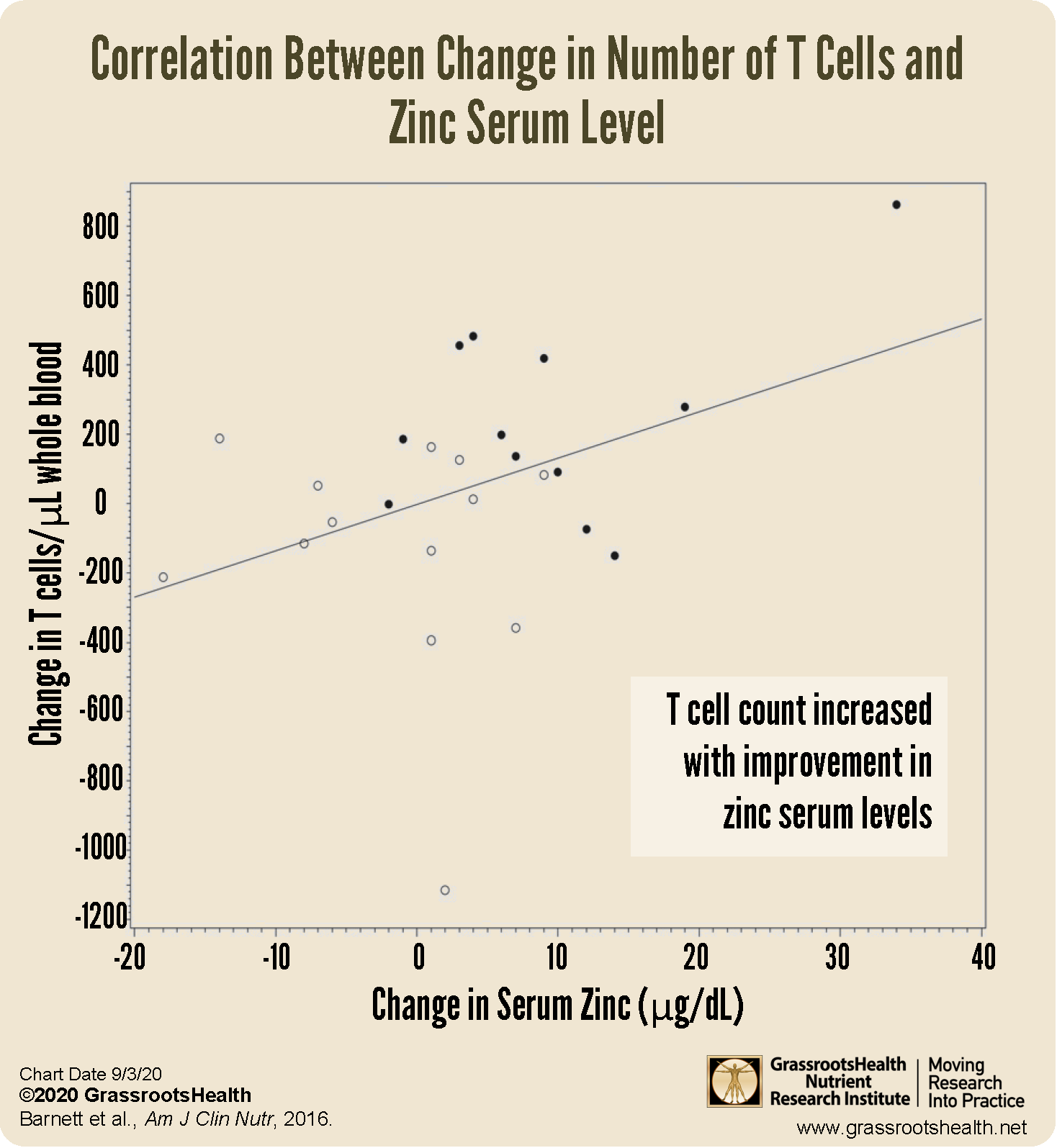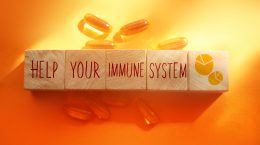Published on September 9, 2020
Zinc is a nutrient known to benefit the immune system, and deficiency of zinc impairs the capacity of many different immune cells to carry out their functions. Studies have shown that zinc may reduce the risk and duration of infections such as pneumonia, the common cold, and the flu, especially in children and the elderly. Zinc plays a central role in T cell-mediated function and immune response to infectious disease. Zinc is also
- A necessary co-factor for the development and function of many different types of immune cells, including macrophages, neutrophils, natural-killer cells, and T cells
- Needed for signaling between the cells of the immune system, so that specific cells can know what specific actions to take in response to a stimulus
- Anti-inflammatory and antioxidant properties
Nursing Home Study Evaluates Effect of Zinc on Immune Function
 A randomized, double-blind, placebo controlled study published by Barnett et al. identified 31 elderly individuals (ages 65 and older) in nursing homes, out of 53 who were screened, with low zinc levels (serum zinc below 70 ug/dL). Those 31 were then assigned to receive either 30 mg of zinc per day (n=15) or a placebo with only 5 mg zinc per day (n=16). Both of these groups received supplementation for 3 months, with serum zinc measured at baseline and again at 3 months. Additional measures for immune response were also taken to get a better idea of how zinc supplementation and serum level affected lymphocyte proliferation, with measurements of T cells, helper T cells, cytotoxic T cells, B cells, natural killer cells, and natural killer T cells.
A randomized, double-blind, placebo controlled study published by Barnett et al. identified 31 elderly individuals (ages 65 and older) in nursing homes, out of 53 who were screened, with low zinc levels (serum zinc below 70 ug/dL). Those 31 were then assigned to receive either 30 mg of zinc per day (n=15) or a placebo with only 5 mg zinc per day (n=16). Both of these groups received supplementation for 3 months, with serum zinc measured at baseline and again at 3 months. Additional measures for immune response were also taken to get a better idea of how zinc supplementation and serum level affected lymphocyte proliferation, with measurements of T cells, helper T cells, cytotoxic T cells, B cells, natural killer cells, and natural killer T cells.
What did the study find?
Of the initial 31 participants, 25 completed the study (12 from the zinc group and 13 from the placebo group). At the end of the 3-month period, while the average change in zinc level was 16% higher in the zinc group compared to the placebo group (p = 0.007), 42% of those who received 30 mg of zinc per day did not achieve adequate levels of zinc (70 µg/dL), suggesting that a higher dose or more time than the 3-month study period may have been necessary to achieve the target level.
Interestingly, the study also found that those in the zinc group experienced improvements in lymphocyte proliferation and saw a significant increase in the number of T cells (as shown in the chart above). A correlation was found between the change in zinc concentration, lymphocyte proliferation (p=0.02), and the number of T cells in the blood (p=0.06). Combined with the importance of T cells for resisting infection, this study suggests that improving zinc status in those who are deficient may help to reduce the risk of infections such as pneumonia.
Are you getting enough zinc?
Could a zinc deficiency, or deficiency in other immune-important nutrients such as vitamin D, be putting a damper on your immune response? Do you know your levels of other immune-important nutrients as well? Find out by testing your vitamin D (25(OH)D), with or without your omega-3s, magnesium and other essential elements (including copper and zinc), as well as your inflammation levels, with the Immune Boost home test kit offered by GrassrootsHealth. Measuring levels is the only way to know if you are supporting your immune system with proper nutrient status, and whether additional changes should be made with supplementation, dietary changes, or both.
Enroll now with the Full Immune Boost Panel (which includes tests for vitamin D, Omega-3 Index, magnesium, zinc, selenium, copper, and hsCRP), and get 10% off when you use coupon code BoostTen at checkout.
Are You Getting Enough Vitamin D to Help Yourself?
We’re in a time of great crisis that could be greatly affected by making sure you and everyone you know has a serum level of at least 40 ng/ml. Help us help you.
Specific markers that influence immune health are suggested for testing as part of this project including:
- Vitamin D
- Omega-3 Index
- Essential elements magnesium, selenium, and zinc
- hsCRP
How can I track my nutrient intake and levels over time?
To help you track your supplement use and nutrient levels, GrassrootsHealth has created the Personal Health Nutrient Decision System called
For each specific supplement, you can track what days you take it, how much, and many other details. This will help you know your true supplemental intake and what patterns of use work for you to reach and maintain optimum nutrient levels. Check it out today!








